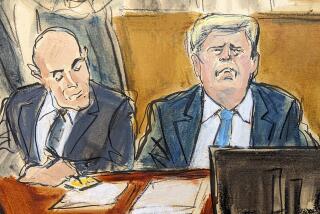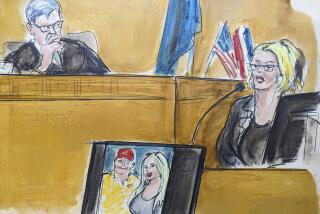Clinton Aide at Center of Tapes Clash
- Share via
WASHINGTON — Investigators trying to determine why the White House failed for months to disclose subpoenaed videotapes of President Clinton’s exclusive fund-raising events now are focusing on whether a senior presidential aide had prior knowledge of the tapings, according to people familiar with the inquiry.
The role played by White House aide Cheryl D. Mills, who holds the dual titles of deputy assistant to the president and deputy counsel to the president, is of strong interest to congressional investigators. Mills over the better part of the past year has helped handle the White House response to subpoenas from the Justice Department and two congressional committees for materials, including videotapes, related to Clinton’s fund-raising.
But unlike a handful of other White House lawyers who were newly arrived and perhaps unaware of the nuances of presidential events, Mills was a veteran at the Clinton White House. And Mills also had direct contact during the 1996 campaign with the unit that conducted the videotaping, The Times has learned.
Mills is scheduled to be questioned under oath privately this morning on Capitol Hill by staff of the Senate Governmental Affairs Committee. Mills declined, through a White House spokesman, to be interviewed by The Times. Lanny J. Davis, a White House special counsel, said that Mills has done nothing improper.
The videotapes, many of which have been played publicly over the past few days, have proved embarrassing to the White House. The footage shows Clinton conferring at various events, including White House coffees, with some of the now more controversial figures of the 1996 campaign.
Congressional and federal investigators had been seeking documents and tapes to determine whether Clinton or other officials improperly used the White House to raise campaign money.
Spokesmen for the White House have said that the delayed disclosure of the videotapes resulted from mistakes, not intentional deceit. Atty. Gen. Janet Reno earlier this month ordered one of the White House lawyers, Special Counsel Lanny A. Breuer, to answer questions about the matter before a grand jury in Washington.
The chairmen of the separate congressional committees investigating aspects of fund-raising for the 1996 elections announced Friday that they would coordinate in examining the White House handling of the videotapes.
“We will try to determine who should be held accountable for the repeated denial by the White House that hundreds of subpoenaed tapes existed,” said Sen. Fred Thompson (R-Tenn.), chairman of the Senate Governmental Affairs Committee.
Thompson also said that his committee plans hearings next week on the delayed disclosure of the videotapes.
The videotaping of Clinton’s events was done in the open. Participants in some of the taped sessions can be seen looking toward the camera operator.
Because of her particular role and broad experience, investigators want to know whether Mills would have been able to step forward and facilitate the disclosure of the footage after the subpoenas began arriving in March.
“It’s the lawyer’s obligation to respond truthfully and completely to the subpoena,” said Jan Lawrence Handzlik, a former federal prosecutor in Los Angeles who heads the American Bar Assn.’s West Coast committee on white-collar crime.
White House lawyers have said that they properly sought all materials requested in the subpoenas. The breakdown, they said, happened because the full request inadvertently was not circulated to the videotaping unit.
Congressional investigators suspect that senior White House officials involved knew about the videotapes and decided not to correct the oversight.
Lawyers of the Senate committee who are to question Mills privately today are expected to bore in on her familiarity with the taping of a range of Clinton’s activities.
Among other things, investigators are seeking to verify details of a meeting between Mills during the reelection campaign in the summer of 1996, with a top official of the White House Communications Agency, the unit that conducted the videotaping.
“She met with WHCA during the campaign to discuss what they could and could not do and what they should and should not videotape,” said one official familiar with the matter.
Mills’ objective at the time, according to the official, was to advise that taxpayer-supported resources, including the videotape unit, not be used for partisan political purposes.
“She was telling them what types of events they could not video-record and how they could not get involved in political activities, being a government agency,” said the official, who spoke on condition of anonymity. “And [that] they had to focus just on recording the presidency.”
Davis, the White House special counsel, said Friday that Mills recalls speaking with the communications unit about telephone services it provided but not about videotaping. The communications office provides secure phone lines for the president wherever he travels. Davis said that Mills was concerned during the campaign about clarifying when staff members who were conducting political or personal business needed to reimburse the government for use of toll-free lines provided by the agency.
“Miss Mills only recalls having conversations with the communications agency concerning ground rules for making telephone calls on either personal or political business using the WHCA facilities . . . ,” Davis said. “That doesn’t mean she’s denying [that] she [discussed] anything else. She said that’s all she can remember.”
Within the past few days, White House Counsel Charles F.C. Ruff informed lawyers with the House Government Reform and Oversight Committee that Mills was among the administration lawyers who had been involved in the production of documents, including the long-awaited disclosure of the videotapes.
Lawyers involved with the campaign finance investigations said that Mills has played a role, directly or in a supervisory capacity, in the White House response to virtually every subpoena for campaign-related materials. Over the past few days, Mills was consulted by other White House lawyers about whether some of the newly disclosed tapes were directly responsive to the months-old subpoenas.
Congressional investigators are not satisfied with the explanations of White House lawyers.
“There was, without question, clear noncompliance with a subpoena,” said Richard D. Bennett, chief counsel to the House committee. “Clearly, somebody at the White House knew full well the videotapes were in the [House committee’s March 4] subpoena. It was spelled out on the first page.”
Bennett, a former U.S. attorney in Baltimore, added: “Somebody at the White House knew that the videotapes were not produced in response to the subpoena. And somebody at the White House knew that the videotapes existed. The final question is: Is that that somebody the same person?”
More to Read
Get the L.A. Times Politics newsletter
Deeply reported insights into legislation, politics and policy from Sacramento, Washington and beyond. In your inbox twice per week.
You may occasionally receive promotional content from the Los Angeles Times.











